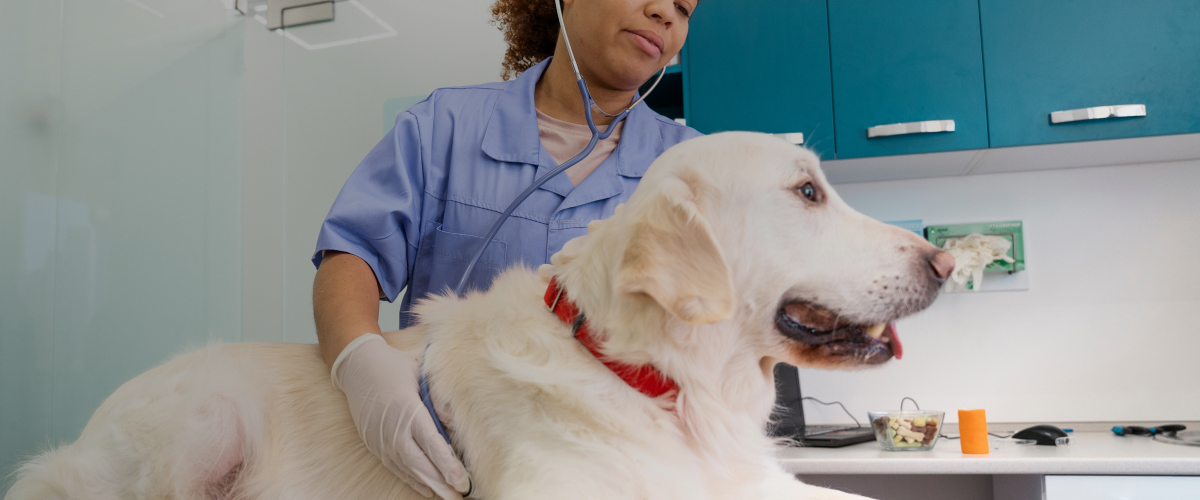Blog
-

Lifespan of Pets
Understanding the lifespan of pets helps you prepare for each stage of your companion’s life. From puppies to seniors, knowing how long your pet is likely to live allows for better care, planning, and love every step of the way.
-

Ensuring a Safe Car Trip With Your Senior Pet
Traveling with a senior pet requires extra care and attention. Learn how to keep your older dog or cat safe, comfortable, and calm during car trips with tips on carriers, temperature control, breaks, and emergency prep.
-

Ways to Strengthen Your Bond with Your Senior Pet
Strengthening your bond with a senior pet is key to ensuring their happiness and well-being in their golden years. From creating a comfortable environment to enjoying quiet time together, these tips will help you deepen your connection and make the most of every moment.
-

Human Medications that are Toxic to Pets
Many common human medications can be highly toxic—and even fatal—to pets. This guide outlines the most dangerous drugs for dogs and cats, symptoms of poisoning, and what to do in an emergency.
-

What to Expect During In-Home Pet Euthanasia
In-home pet euthanasia offers a peaceful, compassionate alternative to saying goodbye at the veterinary clinic. This guide explains what to expect during the process, how to prepare, and how it provides comfort for both pets and their families.
-

Importance of Fostering Pets
Fostering pets plays a crucial role in saving animal lives and reducing overcrowding in shelters. Learn why fostering pets is important, how it benefits animals and humans, and how you can get involved.
-

Importance of Preparing for Emergencies
Discover the importance of preparing for emergencies with your pet. Learn how to create a pet emergency plan, build a pet emergency kit, and ensure your furry friend stays safe during unexpected disasters.
-

Dementia in Pets
Dementia in pets, also known as cognitive dysfunction syndrome (CDS), is a common condition in aging dogs and cats. Learn to recognize the signs, understand the causes, and explore treatment options to help your pet live a comfortable and supported life.
-

Why you should microchip your pet
Microchipping your pet is a simple, safe, and effective way to ensure their safety and your peace of mind. Learn why pet microchipping is essential, how it works, and the many benefits it offers for responsible pet ownership.
-

Senior Pet Breathing Problems
Senior pet breathing problems are a common concern as animals age, often signaling underlying health conditions that require immediate attention. Learn the causes, symptoms, and treatment options for breathing issues in older dogs and cats to ensure your pet stays comfortable and healthy in their golden years.
-

Senior Pet Care Costs
Understanding the financial aspects of senior pet care is crucial for ensuring your furry companion enjoys a happy and healthy life in their golden years. From veterinary expenses to special diets and mobility aids, this guide explores the key costs involved in caring for aging pets and offers tips to manage these expenses effectively.
-

Learn About Pet Exercises
Discover the importance of pet exercises and how they contribute to your furry friend’s overall health and happiness. Learn practical tips and routines to keep your pets active, fit, and mentally stimulated.
-

Learn about Hospice Care
Hospice care for pets offers compassionate, end-of-life support focused on comfort, dignity, and quality of life. Learn how veterinary hospice services can guide pet owners through this emotional time with medical care, pain management, and emotional support tailored to pets’ unique needs.
-

Learn About Boxer
Curious about the Boxer dog breed? Learn about the Boxer’s personality, care needs, history, and why they make loyal, energetic companions for active families.
-

Learn About Border Collie
Discover the intelligence, energy, and charm of the Border Collie. Learn everything you need to know about this highly trainable and affectionate breed, from temperament to care tips.
-

Socializing your Senior Pet
Socializing your senior pet can greatly enhance their emotional health, reduce anxiety, and improve their quality of life. While older pets may be set in their ways, it’s never too late to introduce them to new experiences, people, or animals in a gentle, supportive way. This guide explores effective techniques for socializing senior pets and…
-

Dealing with Senior Pet Anxiety
Senior pet anxiety is a common issue many pet owners face, often due to aging-related factors like cognitive decline, sensory loss, and health issues. Understanding the signs and implementing effective strategies can significantly improve your older pet’s quality of life. This article explores practical ways to ease senior pet anxiety and help them feel safe…
-

Comfortable Grooming of Older Pets
Grooming senior pets requires a gentle touch and special care. Learn the best techniques and tips for ensuring a safe, stress-free grooming experience that supports the health and comfort of your aging pet.
-

Top Senior Pet Health Concerns
As pets age, their health needs change significantly. Understanding the top senior pet health concerns can help pet owners take proactive steps to ensure their furry companions enjoy a happy, comfortable life in their golden years.
-

Learn about Senior Pet Quality of Life
As pets age, their needs change significantly. In this article, we’ll explore the most effective ways to ensure your senior pet remains happy, healthy, and comfortable.
-

Children and Senior Pets
Here are several ways to help your children respect your senior pet’s needs, fostering a harmonious relationship for both your children and your aging pet.
-
Learn about Persians
Explore the luxurious world of Persian cats—graceful, gentle, and irresistibly fluffy. Discover their history, personality traits, grooming needs, and why they’re one of the most cherished cat breeds in the world.
-

Learn about Himalayans
Discover the charm of Himalayan cats—affectionate, blue-eyed beauties with luxurious coats. Learn about their personality, care needs, and why they make perfect indoor pets in this comprehensive guide.
-

Learn about Siamese Cats
Siamese cats are one of the most recognizable and beloved cat breeds, known for their striking blue eyes, sleek coats, and vocal personalities. This guide explores their history, unique characteristics, temperament, and care requirements.
-

Learn about Savannah
Savannah cats are an exotic and highly sought-after hybrid breed known for their striking appearance, intelligence, and energetic personalities. This guide explores their origins, temperament, care needs, and why they make such unique pets.
-

Learn about Bengals
The Bengal cat is a striking and energetic breed, known for its wild appearance, leopard-like spots, and playful personality. Discover the origins, characteristics, care tips, and reasons why Bengal cats are a favorite among cat enthusiasts worldwide.
-

Learn about Maine Coons
The Maine Coon cat is one of the most popular and beloved cat breeds, known for its large size, gentle personality, and luxurious fur. Learn everything about Maine Coons, from their history and characteristics to care tips and why they make excellent pets.
-

Learn about Beagles
Beagles are one of the most popular dog breeds worldwide, known for their friendly nature, intelligence, and incredible sense of smell. Whether you’re considering adopting a Beagle or simply want to learn more about this lovable breed, this guide covers everything from their temperament to training tips and health considerations.
-

Learn about Corgies
Corgis are one of the most beloved dog breeds, known for their adorable short legs, playful personality, and remarkable intelligence. Whether you’re considering adopting a Corgi or simply want to learn more about this charming breed, this guide covers their characteristics, training needs, and essential care tips.
-

Learn about Rottweilers
Rottweilers are one of the most powerful and intelligent dog breeds, known for their loyalty and protective nature. Whether you’re considering adopting one or just want to learn more, this article covers everything from their history and temperament to training tips and health care essentials.
-

Learn about Chihuahuas
Chihuahuas are one of the most popular and recognizable dog breeds in the world. With their tiny stature and big personalities, they make excellent companions for a variety of owners. This article explores everything you need to know about Chihuahuas, from their history and temperament to training tips and health considerations.
-

Learn about Mutts
Mutts, or mixed-breed dogs, are some of the most unique and lovable companions. With their diverse genetics, they often have fewer health issues, longer lifespans, and incredible personalities. Learn why mutts make great pets in this comprehensive guide.
-

Learn about Saint Bernards
Saint Bernards are gentle giants known for their loyalty, intelligence, and rich history as alpine rescue dogs. Discover their origins, temperament, and care needs in this detailed guide.
-

Learn about Labrador Retrievers
Labrador Retrievers are one of the most popular dog breeds worldwide, known for their friendly nature, intelligence, and versatility. Whether you’re considering adopting one or simply want to learn more about them, this comprehensive guide covers their history, characteristics, training tips, and health care. Read on to discover why Labradors make such amazing companions.
-

Learn about Huskies
Huskies are energetic, intelligent, and friendly dogs known for their striking appearance and strong endurance. Whether you’re considering adopting one or simply fascinated by the breed, this guide covers everything from their history to care tips. Read on to discover why Huskies are among the most beloved dog breeds.
-

Learn about Dalmatians
Dalmatians are one of the most distinctive and beloved dog breeds, known for their iconic spotted coats and energetic personalities. Whether as loyal family companions or skilled working dogs, these intelligent and active canines have a fascinating history and unique care needs. Read on to learn everything about Dalmatians, from their temperament to training tips.
-

Learn about German Shepherds
German Shepherds are one of the most intelligent, loyal, and versatile dog breeds. Whether as family pets, working dogs, or service animals, their protective nature and trainability make them a top choice for dog lovers worldwide. Learn everything about their history, temperament, care, and training in this comprehensive guide.
-

Learn about Golden Retrievers
Golden Retrievers are among the most popular dog breeds, known for their friendly nature, intelligence, and affectionate personalities. Whether as loyal family companions, therapy dogs, or skilled working dogs, they bring joy and companionship to households worldwide. Read on to discover everything about Golden Retrievers, from their history and temperament to training and care tips.
-

Learn about French Bulldogs
French Bulldogs are one of the most popular companion dog breeds, known for their affectionate nature, compact size, and distinctive bat-like ears. Whether you’re considering adopting one or simply want to learn more about this lovable breed, this guide covers everything from their history and temperament to care tips and health considerations.
-

Collapsing Episodes in Senior Pets
Collapsing episodes in senior pets can be a worrying issue, and they may occur due to various underlying health problems. The term “collapse” often refers to sudden episodes where a pet becomes weak or loses its ability to stand or remain conscious temporarily.
-

Health Screening for Senior Pets
Health screening for senior pets is crucial for detecting age-related health issues early. Regular check-ups, diagnostic tests, and preventive care help ensure your aging companion stays happy and healthy.
-

Adopting a Senior Pet
Adopting a senior pet is a rewarding experience that brings love and companionship while giving an older animal a second chance at a happy life. Learn why choosing a senior pet can be one of the best decisions you make.
-

Special Needs of Senior Exotic Pets
Caring for exotic pets requires specialized knowledge, dedication, and preparation. Discover essential tips to ensure your exotic companion thrives in a safe and nurturing environment.
-

Senior Pets Socialization
Discover practical tips and expert advice on socializing senior pets to improve their quality of life. Learn how to introduce older dogs or cats to new environments, people, and other animals while ensuring their comfort and well-being.
-

Pet Aftercare: Aquamation vs. Cremation
Choosing the right aftercare for your beloved pet can be a difficult decision. As pet owners seek more compassionate and environmentally friendly options, aquamation and cremation have become two leading choices. In this article, we explore the key differences between pet aquamation and cremation, helping you make an informed decision for your furry companion.
-

Plants that are toxic for pets
Protect your furry friends by learning which common household and garden plants are toxic to pets. From lilies to aloe vera, discover the risks and how to keep your pets safe.
-

Aging Pets
Learn how to care for aging pets with expert tips on nutrition, exercise, and health monitoring. Discover ways to enhance their comfort and well-being during their senior years, ensuring they enjoy a happy, fulfilling life.
-

Dental Care on Senior Pets
Caring for a senior pet’s dental health is essential to ensuring they stay comfortable and healthy in their golden years. By prioritizing dental care, pet owners can improve their senior pet’s quality of life, helping them enjoy each day with a happy, healthy smile.
-

How to Prepare a Pet Sitter to Care for Your Senior Pet
Preparing a pet sitter to care for your senior pet ensures their comfort and well-being in your absence. Learn key tips to communicate their special needs, routines, and health care requirements effectively.
-

Eye Problems in Senior Pets
Senior pets are prone to eye problems that can impact their quality of life. Learn to recognize common eye conditions and explore ways to ensure your aging pet’s vision and comfort are well-maintained.
-

Understanding the Stages of Grief
Losing a beloved pet can be a heartbreaking experience. Understanding the stages of grief can help you navigate your emotions and find ways to honor your cherished companion.
-

Supporting a Friend after Pet Loss
Losing a pet is a heartbreaking experience. Learn how to support a friend grieving the loss of their furry companion with empathy and care. From listening to their feelings to helping them honor their pet’s memory, discover thoughtful ways to be there for your friend during this difficult time.
-

Children & Pet Loss
Losing a pet can be a child’s first experience with grief. This article offers practical tips to help children navigate the loss of a beloved pet, from understanding their emotions to creating meaningful ways to remember their furry friends. Support your child in processing this loss with love, patience, and compassion.
-

Creative Ways to Memorialize Your Pet After Cremation
Discover creative ways to memorialize your pet after cremation, from jewelry and artwork to memorial gardens and keepsakes. Honor your beloved companion with personalized tributes that celebrate their life and bring lasting comfort to your heart.
-

Eco-Friendly Options for Pet Cremation
Explore eco-friendly options for pet cremation, including aquamation, biodegradable urns, and natural burial. Honor your pet’s memory with sustainable choices that reflect your love for them and the planet. Learn how these green alternatives can provide a meaningful farewell.
-

Pet Loss and Workplace Grief: Should Companies Offer Bereavement Leave?
Should companies offer bereavement leave for pet loss? This article explores the emotional impact of pet grief, the benefits of compassionate workplace policies, and how employers can support grieving employees. Learn why recognizing pet loss matters.
-

Navigating Pet Afterlife Services: Cremation, Burial, and Alternatives
Saying goodbye to a beloved pet is never easy. This guide explores pet afterlife services—from cremation and burial to eco-friendly alternatives—to help you honor your pet’s memory in a meaningful way. Discover options that bring comfort and closure.
-

Pet After Life Care
Pet afterlife care is a deeply personal process that helps pet owners honor and cherish their furry friends after they’ve passed. Learn about cremation, burial options, keepsakes, and how to choose what feels right for your family.
-

In-Home Euthanasia – What you need to know
Saying goodbye to a beloved pet is one of the hardest decisions pet owners face. Learn about in-home pet euthanasia, its benefits, what to expect, and how to prepare for a peaceful farewell in the comfort of your home.
-

Safe car trips with senior pets
Traveling with senior pets requires special precautions to ensure their safety and comfort. Learn how to prepare for car trips with older animals, from secure transport to managing their health needs.
-

Loss of a pet and the impact it has on the pet parents
The loss of a pet is a profound experience that deeply affects pet parents. This article explores the emotional impact, coping strategies, and ways to honor the cherished bond shared with a beloved animal companion.
-

The Importance of Animal Shelters
Animal shelters play a vital role in providing safety, care, and second chances for homeless and abandoned pets. Discover how these organizations impact communities and how you can support their mission to save lives.
-

Pet Cancer Awareness Month
November is Pet Cancer Awareness Month, a time to educate pet owners about cancer risks, early detection, and treatment options. Learn how to protect your furry friends and support their health during this crucial month of awareness.
-

Tick-Borne Diseases in Senior Pets
Senior pets are more vulnerable to tick-borne diseases due to their aging immune systems. Lyme disease, ehrlichiosis, and Rocky Mountain spotted fever are just a few conditions that can impact their health. Regular tick checks, preventive treatments, and careful monitoring for symptoms are key steps in protecting senior pets from these harmful diseases, ensuring they…
-

Ways to Care for your Paralyzed Pet
Caring for a paralyzed pet may seem challenging, but with the right approach, they can lead a fulfilling life. Using mobility aids, maintaining hygiene, managing bladder and bowel needs, and providing physical therapy are key ways to help paralyzed pets stay comfortable and active. With patience and compassion, you can enhance your pet’s quality of…
-

National Diabetes Month
November is National Diabetes Month, a time to spread awareness about diabetes prevention, management, and support for those living with this chronic condition. Learn about diabetes risk factors, healthy lifestyle tips, and the importance of early detection for better health outcomes.
-

National Senior Pet Month
November is National Senior Pet Month, a time to celebrate the special bond senior pets bring to our lives and to encourage their adoption. Discover why senior pets make wonderful companions and how you can help older animals find loving homes.
-

Choose safe treats for your senior pet
As pets age, their dietary needs and digestive sensitivities change. Discover the best practices for selecting safe, nutritious treats for senior pets to ensure they enjoy their golden years with optimal health and vitality.
-

Guide for Pet Wellness
Keeping your pet healthy and happy requires more than just a balanced diet and regular checkups. This comprehensive guide to pet wellness covers everything from exercise and nutrition to preventive care and mental health, ensuring your pet lives a long, fulfilling life by your side.
-

Weight loss in Senior Pets
In this article, we’ll explore the potential causes of weight loss in senior pets, when to seek veterinary care, and how to manage your pet’s weight to keep them healthy in their later years.
-

Senior Pet Training
Training isn’t just for puppies and young pets—senior pets can benefit greatly from ongoing training, too! In this article, we’ll explore the benefits of training older pets, tips for effective senior pet training, and how to tailor your approach to their changing needs.
-

Is My Senior Pet in Pain?
As pets age, their bodies go through significant changes, and many senior pets experience discomfort or pain due to various health conditions. Here’s how to tell if your senior pet is in pain and what you can do to help.
-

Why Does My Senior Pet Have Diarrhea?
nderstanding the potential causes and knowing when to seek help is crucial for maintaining your pet’s well-being. Here’s a look at why your senior pet might have diarrhea and what you can do about it.
-

Senior Pets and Respiratory Infections
Vaccines are very important to our pets, even senior ones. Read more to know more about the importance of this topic.
-

Your Senior Pet DOES need Vaccines!
As pets age, many owners wonder if vaccines are still necessary. This article will explain why vaccines are essential for older animals, dispelling myths and providing key insights to help you protect your pet’s health during their golden years.
-

Adopt a Shelter Dog Month
Let’s explore why Adopt a Shelter Dog Month is so important, the benefits of adopting a shelter dog, and how you can get involved to make a difference.
-

Pitbull Awareness Month
Let’s explore the importance of Pitbull Awareness Month, address common myths, and discuss how to support this often-misjudged breed.
-

Appreciate Mutts
What Is a Mutt? A mutt, or mixed-breed dog, is a dog whose ancestry includes two or more different breeds. Unlike purebred dogs that are bred for specific traits, mutts have a combination of characteristics inherited from a variety of breeds, making each one truly unique. They come in all shapes, sizes, colors, and temperaments,…
-

World Rabies Day
World Rabies Day, a global day of action and awareness aimed at preventing the spread of rabies and ultimately eliminating this deadly disease.
-

Travel Tips for Pets
Traveling with pets can be a fun and rewarding experience, but it requires careful planning to ensure their safety and comfort. Here are some tips for traveling with pets.
-

Senior Pet Grooming
Senior pet grooming is an essential part of maintaining your older pet’s overall health and well-being. As pets age, their grooming needs change, and they may require more frequent care and attention to stay comfortable and clean.
-

Changes in Senior Pet Appetite
Changes in senior pet appetite are common and can often signal underlying health issues or natural aging processes.
-

Understand Senior Pet Body Language
Understanding senior pet body language is essential for providing proper care and recognizing when your older pet may need extra attention.
-

Ways to Memorialize Your Cherished Pet
Losing a cherished pet is a deeply emotional experience, and finding meaningful ways to memorialize them can bring comfort during the grieving process. Here are ways to memorialize your beloved pet and celebrate them.
-

Ways To Keep Your Senior Pet Active
Keeping your senior pet active is crucial for maintaining their physical health, mental well-being, and overall quality of life. Here are some effective ways to keep your senior pet active.
-

Panting and Senior Pets
Panting in senior pets is a common occurrence, but it can sometimes be a sign of underlying issues that need attention. While panting is a normal behavior in dogs, especially after exercise or in warm weather, excessive or unusual panting in older pets can indicate discomfort, pain, or a medical condition that requires veterinary care.
-

Home Hospice for Senior Pets
Home hospice care for senior pets is an option that many pet owners consider when their beloved animal reaches the end of its life.
-

Children and Pet Loss
The bond between children and their pets is often deep and profound, making the loss particularly difficult to process. Helping a child navigate this emotional journey involves providing support, understanding, and clear communication.
-

Children and Senior Pets
Both children and senior pets can bring a lot of joy to a household, but they also have specific needs and considerations to ensure they coexist harmoniously.
-

Pet Aftercare: Handle the Loss
Handling the loss of a pet is a deeply emotional experience. The grieving process can be challenging, and it’s important to find ways to cope with the loss. Here are some strategies and suggestions to help you navigate through this difficult time.
-

Pet Aftercare: Private X Communal
When considering pet aftercare options, pet owners often choose between private and communal arrangements. Each option has distinct characteristics that cater to different needs and preferences. Understanding the differences between private and communal pet aftercare can help you make an informed decision that best honors your pet’s memory.
-

Helping a Senior Pet to navigate your home
Helping a senior pet navigate your home involves creating a safe, comfortable, and accessible environment that accommodates their changing needs. As pets age, they may experience mobility issues, reduced vision or hearing, and other health-related challenges. Here’s how you can make your home more senior-pet-friendly.
-

When to adopt a new pet?
Adopting a new pet is a big decision that should be carefully considered. Here are some key factors to think about before making the commitmen.
-

Appreciate Assistance Dogs
Appreciating assistance dogs involves recognizing their invaluable contributions to the lives of those they help and understanding the profound bond between these animals and their human partners.
-

Advantages of Raw feeding for pets
Raw feeding for pets, often referred to as a “raw diet” or “BARF” (Biologically Appropriate Raw Food), involves feeding pets uncooked meat, bones, fruits, and vegetables.
-

Fostering Pets
Fostering pets is a rewarding experience that provides numerous benefits to both the animals and the foster families. Here are some key points to consider when fostering pets.
-

Importance of Pet Hydration
Proper hydration is essential for maintaining the health and well-being of pets. Here are some key reasons why pet hydration is important.
-

Strengthen your Bond with your Senior Pet
Strengthening the bond with your senior pet is essential for their well-being and your relationship. Read on to see five ways to achieve this.
-

Which Chew Toys are Safe for Senior Pets?
Choosing safe and appropriate chew toys for senior pets is essential to ensure they can enjoy chewing without risking dental damage or other health issues. Read to learn some factors to consider when selecting chew toys for senior pets, along with examples of safe options.
-

Eye Changes in Senior Pets
As pets age, they, like humans, can experience various changes in their health, including their eyesight. Understanding these changes can help pet owners provide better care and possibly mitigate some effects of aging. Read to see common eye changes and conditions that can occur in senior pets.



































































































